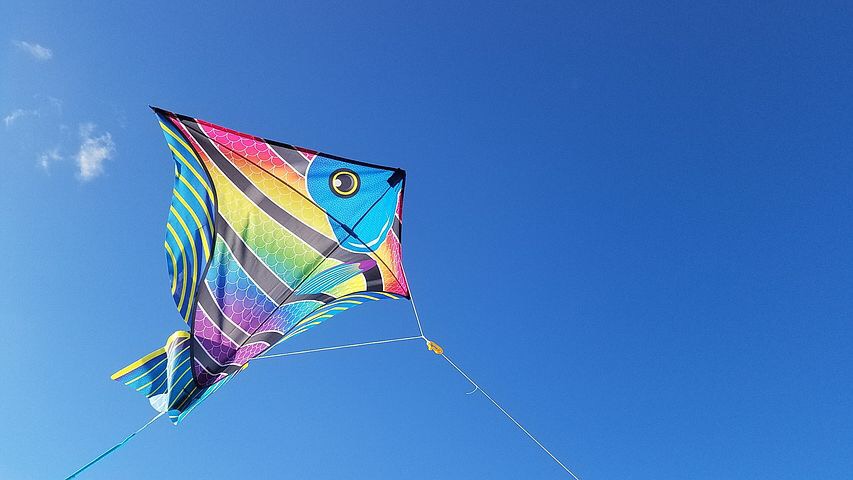
In the journey of life, there will always be opposition, adversities and obstacles. These can be from people, from circumstances or from events. If we are to live a successful, fulfilled, meaningful and happy life, we must know how to face these obstructions in our journey.
How do we stay strong and remain advancing forward despite powerful opposing forces? We can learn awesome lessons from three things: the kite, the sailboat and the salmon.
1. The kite – There are really two lessons here. First, despite the strong wind, the kite stays quite steady in the sky because it is connected by the string to the ground. Once the string snaps, then it will be thrown off by the winds, and will crash somewhere in an unknown place. The string must be sturdy, otherwise a strong wind will cause it to snap. In the same manner in our life, we need to be grounded or linked to a meaningful purpose, a philosophy or a principle. It can be a family, a life goal, a life mission, a wholesome philosophy, or a spiritual life. Despite the opposing wind, we stay on course because the link to that philosophy or goal is strong and clear.
A person with a strong moral fiber will not easily be carried away by temptation, by pleasure or by gainful advantage to do an unethical or unjust act.
The second lesson is that the stronger the wind, the higher the kite flies. Try flying a kite on a weak wind, and the kite falls to the ground. Hence opposition and adversities can strengthen us and make us capable to rising higher in our life, provided the string is strong and tough. Annie Besant, one of the greatest English reformers of the 19th century, wrote that if she were to live her life again, she would forego her pleasures and joys, but not her difficulties and adversities because these were the factors that built her strength of character.
2. The sailboat – the second lesson comes from sailboat, which moves only when the wind blows and pushes its sail. If the wind is going towards south, but the sailboat wants to go to the north, can the sailboat reach such an opposite destination?
Yes, it is possible. And there is something we can learn from sailboat in facing life’s opposing forces.
The travel opposite of the wind direction, the sailboat must face the wind in a diagonal northeast direction. When the wind blows from the front, the wind pushes the boat to the side. But because the boat with its rudder is at a diagonal angle, the sideward push actually pushes the boat forward to the northeast even if the wind blow south. After traveling northeast for some distance, the sailboat changes its angle and then faces northwest, moving forward again in that direction. The sailboat then advances against the wind in a zigzag manner.

(Illustration courtesy of rebrn. com/re/eli-if-ships-with-sails-are-heading-the-opposite-direction-as-th-1092918/)
So when we are facing opposing forces that seem stronger than us, we don’t face it frontally but diagonally. We resist but we continue to move forward even if at a slower pace. It’s low-key progress. It’s analogous to judo, where one makes use of the opposing force to one’s advantage.
Suppose a powerful and moneyed political opponent is oppressing you in order to silence you. To fight him frontally may mean being crushed and annihilated. Then do not do so. Stay firm and work in a non-threatening but right direction. Strengthen the work on the flanks that will eventually support your central work when the time is ripe to do so.
3. The salmon — this is a most powerful and sublime lesson from nature.
Salmons are born in high altitudes up to about 2,000 meters high from sea level (more than the height of Mt. Wilson in California). Then they swim towards the ocean and stay there for one to four years. When the time comes for them to lay eggs, they swim back to where they came from, which means that they have to swim upstream against raging waterfalls that may be five feet high or more. It seems impossible because the torrent of the falls is so strong that the salmons are pushed downwards no matter how powerfully they swim. But they never give up. So what do they do?
They leap up the falls and go to the next level. They don’t fight against the falling water. They jump above it.

(Photo courtesy of Earthjustice. org)
This is an example that teaches us that we need make leaps whenever we face apparently insurmountable odds. It is transcending the situation. This is what happens when we discover an insight or attain enlightenment. We transcend the ordinary level of struggle. An enmity can be dissolved by transcending hatred. Then one ceases to have an enemy. In Zen meditation, one transcends rational thinking. It is a leap of intuition.
Nelson Mandela of South Africa, Aurobindo of India and Benigno Aquino of the Philippines are examples political oppositionists and activists who were imprisoned by the reigning government. From the standpoint of their political struggle, they were defeated and quashed. But they leapt beyond the political arena and rose to a higher level of struggle. Like the salmon, they no longer attempted to swim against the water falls. They jumped above and beyond, and attained a high goal than the political struggle. Mandela became an icon of peace, earning him a Nobel Prize; Aurobindo became one of the great spiritual teachers of India who was nominated for the Nobel Peace Prize. Aquino lost his life and became a national hero of the Philippines, not just a President or a another powerful politician. It was his wife and son who became Presidents after he died.
